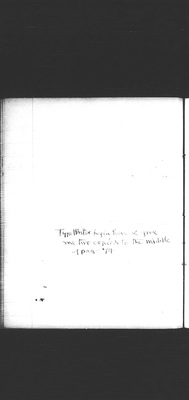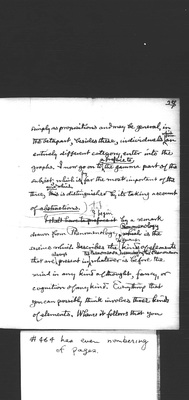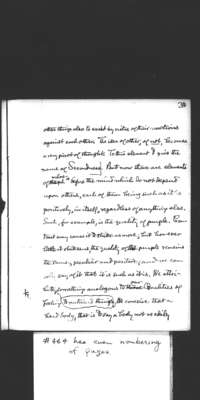Pages
17
24[?]
simply as propositions and may be general, in the beta part, besides these, individuals which form an entirely different category, enter into the graphs. I now go on to a preface to the gamma part of the subject, which is by far the most important of the three, and which is distinguished by its taking account of abstractions.
I begin by a remark drawn from Phenomenology. Phenomenology is the science which describes the different kinds of elements that are always present in the Phenomenon, meaning by the Phenomenon whatever is before the mind in any kind of thought, fancy, or cognition of any kind. Everything that you can possibly think involves three kinds of elements. Whence it follows that you
18
30
cannot possibly think of any one of those elements in its purity. The most strenuous endeavors of thinking will leave your ideas somewhat confused. But I think I can help you to see that there are three kinds of elements, and to discern what they are like. I begin with that one which the rough and tumble of life renders most familiarly prominent. We are continually bumping up against hard fact. We expected one thing, or passively took it for granted, and had the image of it in our minds. But experience forces that idea into the background, and compels us to think quite differently. You get this kind of consciousness in some approach to purity when you put your shoulder against a door,
19
32
and try to force it open. You have a sense of resistance and at the same time a sense of effort. There can be no resistance without effort: there can be no effort without resistance. They are only two ways of describing the same experience. It is a double consciousness. We become aware of ourself in becoming aware of the not-self. The waking state is a consciousness of reaction; and as the consciousness itself is two-sided, so it has also two varieties; namely, vol willing action, where our modification of other things is more prominent than their reaction on us, and perception, where their effect on us is far overwhelmingly greater than our effect on them. And this notion of being such as other things make us is such a prominent part of our life, that we conceive
20
34
other things also to exist by virtue of their reactions against each other. The idea of other, of not, becomes a very pivot of thought. To this element I give the name of Secondness. But now there are elements of the ph what is before the mind which do not depend upon others, each of them being such as it is positively, in itself, regardless of anything else. Such, for example, is the quality of purple. Contrast may cause it to strike us more; but however little it strikes us, the quality of the purple remains the same, peculiar and positive; and we can only say of it that it is such as it is. We attribute to outward things something analogous to these our qualities of feeling. We conceive that a hard body, that is to say a body not readily




